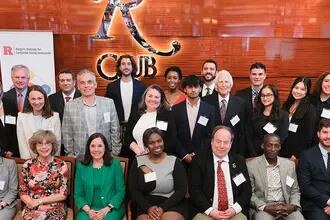
Environmental, Social and Corporate Governance is considered a mindset among companies concerned about more than financial performance.
Showcasing how some companies are doing good
Today’s business world requires companies to do more than generate profits. Investors increasingly want them to also do good, whether it’s reducing carbon emissions, changing the materials they use to make products or donating some of their sales in a socially impactful way.
The Rutgers Institute for Corporate Social Innovation (RICSI) recognizes that businesses have the potential to address some of today’s societal needs in meaningful ways. On Tuesday, Dec. 12, RICSI will host the “Tapping into Brand Potential for Social Good” Conference to showcase the efforts of companies like Prudential and Lycra.
The event is an example of RICSI’s work to prepare current and future business leaders to practice concepts that can achieve both commercial and societal goals. Jeana Wirtenberg, RICSI’s executive director and a Rutgers Business School professor, answered some questions to explain more about CSI, the conference, and the institute.
What is corporate social innovation and why is it important for companies in today’s world?
The principle behind corporate social innovation is that businesses can leverage their unique capabilities and wherewithal to address social needs and in doing so achieve financial goals. Today, expectations about the role of business in society are at an all-time high – whether it is to take on climate justice, health equity, poverty, or any number of other intractable issues.
How do companies tap into their brands for social good?
Even in the past several years, the business headlines have been dominated by ESG, corporate social responsibility efforts and purpose-driven leadership. Rather than focus on types of capabilities in isolation, the businesses that are highly effective at CSI are managing to not only synergize across their various functions but also to intentionally integrate their CSI efforts with their business strategy. Then, they look for social issues with an unmet need and use their creativity and imagination to innovate effective solutions.
Prudential is a company familiar to people in New Jersey and at Rutgers. How does the company carry out social corporate innovation and how does it use its brand to achieve social good?
Prudential is doing a great job on many fronts. At our conference, we’ll hear about their commitment to opportunity, youth, first-generation college students and young change-makers both at Rutgers, across the U.S., and abroad. One very important thing we see from them is their long-standing commitment. Many businesses simply cannot or do not have the staying power due to leadership changes, financial pressures, market changes, etc., that Prudential has demonstrated. It is very uncommon.
Are there other companies winning respect for what they’re doing?
PwC, which like Prudential will be one of our presenters at the conference on Dec. 12, is working with clients to promote business practices that are sound, ethical, and responsible across all stakeholders. Lycra is following their purpose and innovating new ways to make products, and Airbnb is stepping up to provide temporary housing for those with emergency needs. In the institute’s Intro to Corporate Social Innovation class offered to Rutgers MBA students, we highlight great examples from Becton Dickinson’s (BD) seminal work in creating shared value by advancing global health, Unilever’s highly successful Sustainable Living Plan, Johnson & Johnson’s CO2 Reduction Projects, and Merck’s work in Social Impact Innovation, among others.
How does the Rutgers Institute for Corporate Social Innovation prepare business school students for going into the work world with a mindset for corporate social innovation?
Through our course work, the Inspire Training Program, publications, and special events like the Tapping into Brand Potential conference, we promote the pillars of Corporate Social Innovation – Aligning Profit and Purpose, Responsible Business Practices, Advocating for Social Issues and Giving Back to Society.
About the conference: Open to business school students and other Rutgers University students interested in corporate social innovation, the Tapping Brand Potential for Social Good Conference will be held Tuesday, Dec. 12, from 8 a.m. to 2 p.m. at the Livingston Student Center, Livingston Hall, A-B. The conference is being sponsored by the Association of National Advertisers. Register here.
- Susan Todd
Graphic credit: Getty Images
Press: For all media inquiries see our Media Kit


